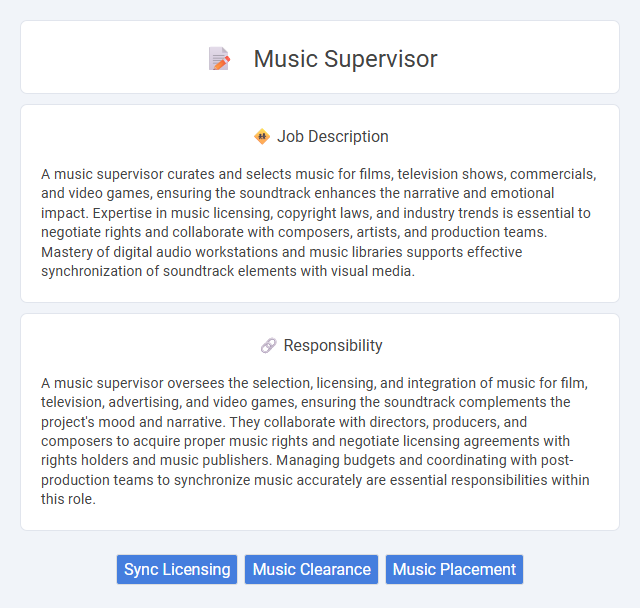
A music supervisor curates and selects music for films, television shows, commercials, and video games, ensuring the soundtrack enhances the narrative and emotional impact. Expertise in music licensing, copyright laws, and industry trends is essential to negotiate rights and collaborate with composers, artists, and production teams. Mastery of digital audio workstations and music libraries supports effective synchronization of soundtrack elements with visual media.
People who thrive in fast-paced, detail-oriented environments with strong communication skills are likely suitable for a music supervisor role. Those with a passion for music, an understanding of licensing laws, and the ability to collaborate with diverse teams may find this job particularly rewarding. Individuals prone to stress or lacking organization might struggle with the demanding responsibilities associated with coordinating music selections for media projects.
Qualification
Music supervisors require a strong background in music theory, sound engineering, and extensive knowledge of various music genres to effectively select and license tracks for film, television, and advertising projects. Proficiency in copyright law, excellent communication skills, and experience with music licensing platforms are essential to negotiate rights and collaborate with artists, producers, and directors. Many employers prefer candidates with a degree in music, audio production, or related fields, along with a proven portfolio of successful projects demonstrating creative and strategic decision-making expertise.
Responsibility
A music supervisor oversees the selection, licensing, and integration of music for film, television, advertising, and video games, ensuring the soundtrack complements the project's mood and narrative. They collaborate with directors, producers, and composers to acquire proper music rights and negotiate licensing agreements with rights holders and music publishers. Managing budgets and coordinating with post-production teams to synchronize music accurately are essential responsibilities within this role.
Benefit
Music supervisors likely enhance film and television projects by selecting tracks that evoke strong emotional responses and complement the narrative. They probably streamline the synchronization of music rights, potentially saving production teams time and reducing legal risks. Their expertise may increase audience engagement and overall project marketability, contributing to greater commercial success.
Challenge
The role of a music supervisor likely involves navigating complex licensing negotiations and budget constraints while selecting tracks that perfectly align with a project's tone. Challenges probably include balancing creative vision with legal and financial limitations, as well as managing tight deadlines under pressure. Effective communication skills and industry knowledge might be essential to overcoming obstacles and securing the right music for various media productions.
Career Advancement
A music supervisor coordinates song selections and licensing for film, television, and advertising projects, blending creative insight with legal expertise. Career advancement often leads from assistant roles to senior supervisory positions, where professionals manage larger budgets and collaborate with top-tier directors and producers. Mastery of industry trends, networking skills, and proficiency in music rights negotiation are critical for securing high-profile projects and executive roles.
Key Terms
Sync Licensing
Music supervisors specialize in selecting and licensing music for media projects, ensuring that all sync licensing rights are properly obtained to legally synchronize music with visual content. They negotiate usage terms with rights holders, manage budgets, and secure clearances for synchronization licenses essential in film, TV, commercials, and video games. Their expertise directly impacts the creative integration of music and the legal compliance of media productions, making them crucial in the entertainment industry's licensing landscape.
Music Clearance
Music supervisors play a critical role in securing music clearance, negotiating rights and licenses for songs used in film, television, and advertising projects. They collaborate with rights holders, including publishers and record labels, to obtain synchronization and master use licenses that ensure legal usage of music. Effective music clearance management prevents copyright infringement, enabling seamless integration of music into media productions.
Music Placement
Music supervisors specialize in music placement by selecting, licensing, and integrating songs into film, television, and advertising projects. Their expertise ensures that the soundtrack enhances the narrative while adhering to budget and legal requirements. Effective music placement drives emotional impact and audience engagement through strategic synchronization of music with visual content.
 kuljobs.com
kuljobs.com